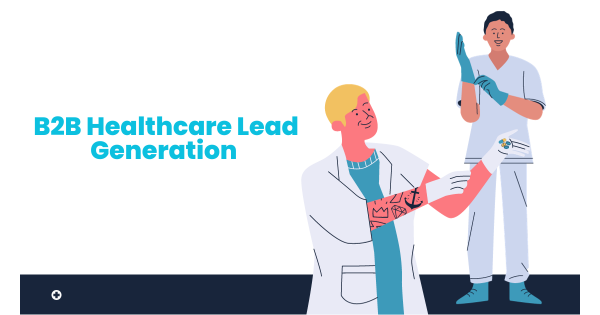B2B Healthcare Lead Generation
B2B healthcare lead generation involves numerous strategies that help healthcare organizations showcase their specialized products/services, network expansion, strategic partnerships and collaboration, effective market positioning, research and development opportunities, revenue and sales growth, etc.
However, lead generation is a long-term process that involves multiple strategies, mediums, and marketing approaches. To make it easy for you, below is a detailed guide that takes you through the process of B2B healthcare lead generation.
-
Understand your audience
Understanding your audience is the first and critical step in the healthcare lead-generation process. The more you understand your audience, the better you can tailor your messaging and plan result-oriented lead-gen strategies.
Start by understanding your position in the market, basic audience segmentation, and their expectations based on age, profession, etc. Segment your audience and develop detailed buyer personas for each target group. This helps to create targeted messaging and effective lead-gen strategies that resonate with your prospective healthcare audience.
-
Invest in driving organic traffic
It is known that modern-day consumers “Google” each query that hits their mind, and websites that appear at the top are often perceived as trustworthy and credible resources. Although driving organic traffic is a time-consuming process with a lot of SEO techniques involved, investing in SEO strategies is the best way to the healthcare lead generation process.
When users click on your website after searching online, they can be considered the most authentic and valid leads since they have come to your website to collect information about product/services which is of interest. So leads you gain from organic traffic are more likely to convert.
-
Build goal-specific landing pages
Goal-specific landing pages are the most effective part of the healthcare lead-generation process. You can tailor the message to a specific audience group and provide targeted healthcare information about the products and services.
When visitors are led to the landing pages that directly address their needs and concerns, visitors are most likely to take the desired action including submitting email addresses, filling out contact forms, asking for more information, feedback forms, and more. This helps to gain quality information about potential leads thus the landing pages drive the lead generation process effectively.
-
Best optimize your website.
The website is a credible resource and central hub of information for visitors. Here are a few ways to optimize your website:
-
- Understand the needs of your target audience and list out the keywords related to your niche.
- Provide valuable information related to industry gaps, challenges, and concerns.
- Optimize CTA for each of the web pages. Clearly outline your services, offerings, discounts, giveaways, perks, etc.
- Optimize your website for local SEO. Display testimonials and case studies. Give access to free resources.
- Another important strategy is to optimize your website for mobile-friendliness.
- Create intent-based pop-ups that encourage users to sign/register/submit their contact details.
Optimizing the website increases online visibility, enhances user experiences, encourages users to take action and submit their contact details, and ultimately helps in the lead generation process.
-
Leverage social media and paid advertisements
Social media is one of the important channels of lead generation. Observe the online behavior of the audience and engage them through personalized and well-crafted content pieces. Find out the most used social media platforms for your niche and leverage them to lead users to your website/landing pages.
Also, each social media platform like Instagram, Facebook, YouTube, and LinkedIn empowers you with several ad-optimizing capabilities. From budget to target audience group and location, aptly optimize your social media advertisements by providing effective CTAs.
Once the audience visits your website/landing page by clicking the ad/post on social media, you will get the list of highly qualified leads through social media Ads and engagement metrics and also by collecting the website visitor’s details in the backend.
-
Do not ignore personalization
Personalization is a powerful strategy to build connections with the audience and engage them effectively. Implement personalization during the process of optimizing websites, landing pages, content creation, and other strategies wherever there is a possibility to provide a personalized experience to visitors. This helps the lead-gen process by helping to build long-term connections, increase loyalty, and boost conversions.
-
Work on providing authentic content/information
Content is the key to attracting potential audience. Modern-day consumers are already overwhelmed by online information and are finding it hard to trust the resources. So leverage the above strategies and provide authentic information/content on your websites, landing pages, social media posts, etc.
This helps to build trust among the audience you can emerge as the reliable resource of your industry/niche. When audiences trust you for information, they are more likely to continue with your brand, engage, and convert.
-
Set KPIs, measure, and optimize your strategies
Key Performance Indicators (KPIs) help to measure and optimize your lead generation strategies. Plan your targets and objectives of the healthcare lead generation process, set a KPI for each of the strategies you implement, and also set an overall campaign KPI.
This helps to measure each of your lead-generation strategies and boosts the overall lead-gen campaign success.
Some of the KPIs for the healthcare lead generation process are:
-
- Website metrics – Unique visitors, page views, etc.
- Engagement metrics – Dwell time, bounce rates, etc.
- Email marketing metrics – Open rates, CTR, etc.
- Social media metrics – Likes, comments, views, clicks, shares, etc.
- SEO performance – Organic traffic, keyword ranking, etc.
- Landing page metrics – Bounce rate, conversion rate, repeated visitors rate, etc.
-
Use offline methods
The above online strategies work great for the healthcare lead generation process, however offline ways too are effective in attracting local audiences and building long-term relationships.
The offline lead-gen methods are:
- Community events
- Referral programs and networking events
- Local Partnerships
- Billboard and outdoor advertising
- TV and radio
- Niche-topic seminars
- Health and wellness programs by specific resource persons
You can use the combination of offline and online strategies as per audience presence to create a well-rounded healthcare lead generation strategy that helps to reach a diverse audience.
-
Leverage AI and chatbots
Healthcare lead generation strategies are numerous and thoughtfully leveraging AI and chatbots in the process of lead generation improves efficiency. From automating responses to audience segmentation to analytic capabilities and 24/7 chatbots to assist the audience, AI and chatbots help you achieve positive user experiences and lessen the burden of human resources.
Conclusion
B2B healthcare lead generation is crucial for healthcare organizations to sustain in the long term. The above is the guide to healthcare lead generation to attract and convert potential leads.
Lead generation strategies need to be well-planned before implementation and healthcare organizations can use the combination of online and offline strategies to strike the balance and reach out to a diverse audience from multiple channels.



